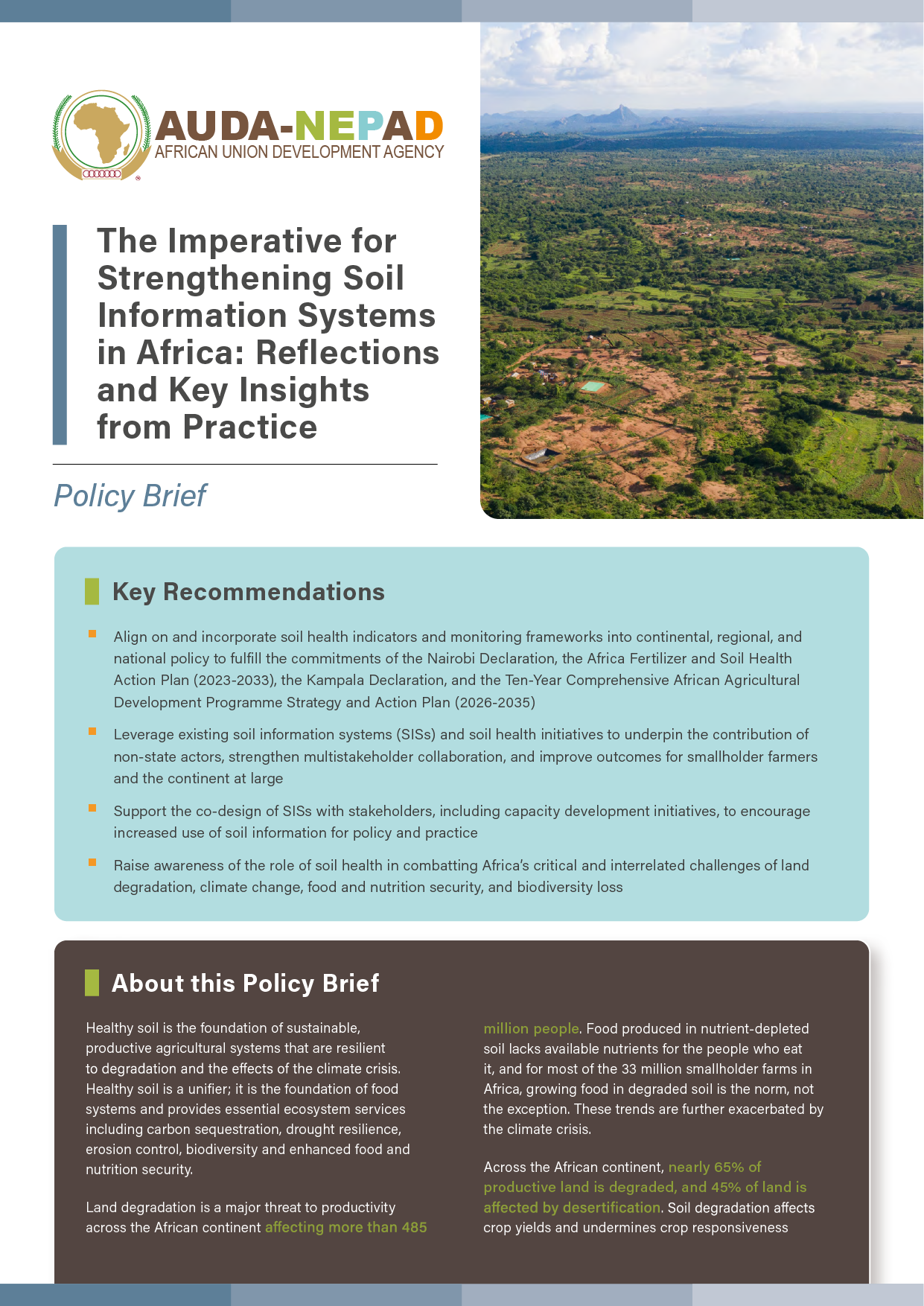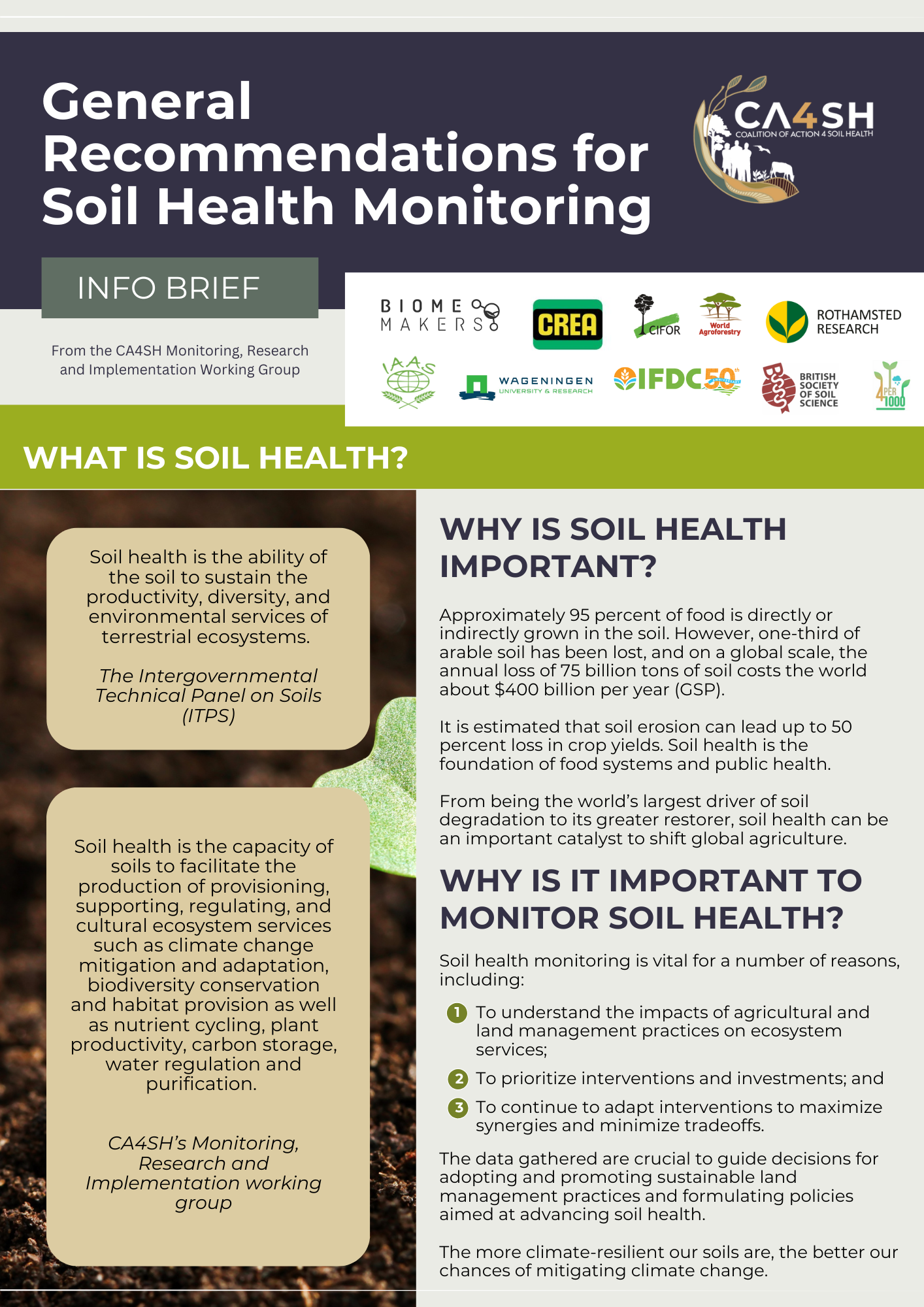
CA4SH is a multilateral, multistakeholder partnership
We are working alongside our membership to collect knowledge, lessons learned, case studies and more to help inform the way forward for stakeholder action for soil health.
Resources presented here are original and generated under the Coalition’s workplan. To browse internal and external resources, visit the Resource Library.
Browse
The Soil Health Resolution is a set of commitments to enable and scale healthy soil practices to mitigate and adapt to climate change, restore biodiversity, improve water resilience, enhance food and nutrition security, and protect natural and cultural heritage.
Healthy soil is the foundation of resilient landscapes, sustainable food systems, and climate adaptation in Africa’s drylands. As a unifying element across climate, nutrition, biodiversity, and restoration agendas, soil health plays a critical role in realising the ambitions of the African Union’s Great Green Wall Initiative (GGWI). With over 65% of productive land degraded and soil erosion undermining agricultural productivity, smallholder farmers across the continent face compounding vulnerabilities. The GGWI Strategy (2024–2034) recognises soil health as central to reversing land degradation and building long-term resilience, aligning closely with the Africa Fertiliser and Soil Health Action Plan (AFSH-AP) (2023 – 2033) and broader goals outlined in the Ten-Year Comprehensive Africa Agriculture Development Programme (CAADP) Strategy and Action Plan (2026-2035).
Healthy soil is critical for ecosystem restoration, climate change mitigation and adaptation, biodiversity conservation, water cycling, farmer livelihoods, and food and nutrition security. Despite its importance, soil health has often been overlooked, but momentum is growing as evidenced by recent high-level initiatives such as the Nairobi Declaration as part of the Africa Fertiliser and Soil Health Action Plan and the European Union Soil Mission: A Soil Deal for Europe. The UN Decade on Ecosystem Restoration was launched on 5 June 2021 to galvanise local, national and global action to restore degraded ecosystems. In the same year, the UN Food Systems Summit (UNFSS) initiated a call for coalitions of action to champion integrated, systemic approaches to transform food systems. The Coalition of Action 4 Soil Health (CA4SH) was launched to bring soil health into focus with participation across sectors and scales to ultimately raise awareness about this critical ecosystem that we depend on, but which is being degraded at unprecedented rates. Since 2021, CA4SH has grown to include nearly 200 members (as of January 2025) representing the public and private sectors, research institutions, non-governmental organisations, farmer organisations and cooperatives, individuals, youth-led organisations, and indigenous organisations to mention some. The initiative has also had a strong focus on gender equity and social inclusion (GESI) in soil and landscape restoration. The Coalition promotes soil as a unifier across a diverse set of stakeholders, building partnerships to overcome critical economic, technical and institutional barriers to the adoption and scaling of healthy soil practices. Furthermore, CA4SH facilitates evidence-based policy and practice action for the scaling of restoration practices that improve soil health. The Private Sector Guiding Group, launched as part of the UNFSS, developed a call to action to support increased investments in healthy soil, and continues to support the actions of the Coalition. Its four working groups focus on communication, soil health monitoring and implementation, policy, and financial investment. In the first three years since its launch, the Coalition has engaged in multinational dialogues and contributed to the adoption of soil health in the outcomes from the UN Framework Convention of Climate Change (UNFCCC) 27th Conference of the Parties (COP27) through the Koronivia joint work on agriculture (now the Sharm El-Sheikh Declaration), the UNFCCC COP28 UAE Declaration on Food Systems and Agriculture, the UNCCD COP16 Riyadh Action Agenda and also launched the Soil Health Resolution. Leveraging on the enabling policy environment, the Coalition catalyses public and private sector action with outcomes for economic returns and growth, productivity and rural livelihoods, climate and nature. The positioning of the Coalition in the current global environmental transition is pivotal to drive the multifaceted benefits that soil health improvement offers to food systems transformation and global adaptation to and mitigation of climate change.
This Brief focuses on soil health on the African Continent, drawing on discussions with senior government officials from Ministries of Agriculture across Africa, who convened in Kigali as part of the Policy Dialogue series in September 2024 to discuss issues related to the implementation of the Africa Fertilizer and Soil Health Action Plan. This Policy Dialogue aimed to: identify policy action to incentivize and support the improvement of soil health and environmentally sustainable fertilizer use, including fertilizer subsidy reform programs; and share lessons learned, challenges and opportunities for policy reform to enhance effectiveness of fertilizer support and other public programs on soil health and sustainability
2024 was a big year for soil health and for the Coalition of Action 4 Soil Health (CA4SH). We engaged global stakeholders in united advocacy to scale soil health through our priority areas of action, including science, policy, finance, youth engagement, and implementation on the ground. Scaling soil health can not happen in a vacuum; it requires the diverse perspectives, expertise, experience, and networks of the global community to come together. CA4SH is uniquely positioned to bring these voices together, offering a community and a meeting place for these partnerships to grow and bloom, and in 2024, we did just that in the name of healthy soil.
African Heads of State and Government formally adopted the Africa Fertilizer and Soil Health (AFSH) Summit Declaration, also known as the Nairobi Declaration, during the AFSH Summit. The AFSH Summit addressed the urgent need to improve soil health and enhance fertilizer utilization across the continent to boost agricultural productivity and alleviate hunger and poverty. These priorities were initially identified in the 2006 Abuja Declaration on Fertilizer for the African Green Revolution.
Furthermore, the 2014 Malabo Declaration under the Comprehensive Africa Agriculture Development Program (CAADP) reaffirmed AU Member States' commitment to inclusive agricultural transformation, building on earlier initiatives such as the 2003 Maputo Declaration on CAADP and the 2004 Sirte Declaration on sustainable agriculture and water management. Despite these commitments, AU Member States have faced significant challenges in implementing the objectives outlined in these declarations.
Only through collaborative, cohesive soil health monitoring efforts can AU Member States ensure that interventions are based on evidence to maximize impact. For example, such a monitoring framework can be used to prioritize, track and adapt locally revelant interventions. In turn these data can be used to inform policy and financial investments. This policy brief outlines the case for African policymakers to scale soil information systems (SISs) and integrate them into continental, regional and national policy frameworks.
To reverse Africa's interrelated challenges of land degradation, climate change, food security and biodiversity loss, African Union (AU) Member States will need to markedly increase the health of their soils and invest in soil restoration that is targeted and based on scientific evidence.
The Coalition of Action 4 Soil Health (CA4SH) is a multistakeholder partnership committed to scaling soil health, globally. CA4SH places a high degree of importance on the role of youth as innovators and experts toward scaling global soil health. Youth are engaged through the #Youth4Soil movement, which includes a working group, mentorship opportunities, and support for speaking and engagement. We also want to highlight youth approaches to advocating for global soil health.
In April 2024, Roël D. Houdanon, Founder & Chief Technical Advisor, Land and Health Association shared an op-ed highlighting the role of youth in defending soil health. He presented several avenues for youth to get involved in scaling soil health:
Awareness Raising
Innovation & Technology
Policy Advocacy
Community Engagement
Education
Science & Research
We reached out to youth partners to learn about their individual approaches to scaling soil health through these thematic action areas.
These are their responses.
The CA4SH Monitoring, Research and Implementation have compiled expert advice and considerations for those looking to monitor soil health.
The Carbon Gap Network or Red de Brechas de Carbono (RBC) project from the Argentine No-Till Farmers Association (Aapresid) takes localized information on climate and the environment and translates it into actionable recommendations for farmers on the ground to maximize their soil’s organic carbon, and foster overall healthier soils.











